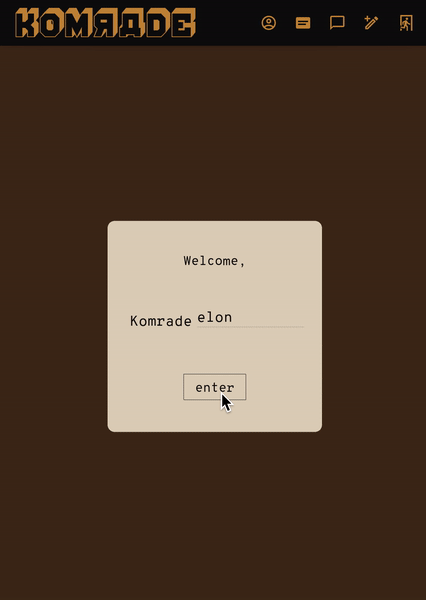| docs | ||
| komrade | ||
| script | ||
| .gitignore | ||
| .python-version | ||
| README.md | ||
| requirements.txt | ||
Komrade
Komrade is a socialist network. It seizes the means of digital production.
Why another social network?
Is a 'socialist network' possible? Although the internet began with anarchic design principles, it quickly consolidated into the hands of a few of the largest corporations in the world. It has effectively recreated the capitalist mode of production within itself: the means of content production (social media platforms) are privatized while the work of production (posting) remains socially distributed. Exploitation inheres in that relation, whether in the industrial factory or the digital platform, because the value you produce is taken from you, concentrated and privatized.
But a digital network can be redesigned. The technology behind these social media platforms is actually quite simple. We can easily build our own social network, one which is secure, insurveillable, and unmonetizable—one which would give people the security they need to communicate about whatever they want, including protesting against capital and the state..
Core principles
Illegible
All of your data are strongly encrypted end-to-end: only you and those you write to can decrypt and read it. To anyone without the right decryption 'key', the data is nonsense.
Untraceable
All network traffic is routed through Tor, a "deep web" of computers so dense even the FBI can't follow you through it. Komrade's "Operator" or central server is accessible only from Tor. It's impossible to tell who is sending what to whom, or even who is using the app at all.
Unmonetizable
What's untraceable is also unmonetizable: your data can't be harvested by technology companies and used for advertising algorithms. You're protected from both surveillance capitalism and the surveillance state.
Decentralized
Data is deleted as soon as possible from Komrade. Komrade's "Operator" simply sorts and holds the mail temporarily: as soon as users log in to download their mail, the messages are deleted from the internet forever.
Democratized
Group accounts or 'collectives', like @portland or @socialists, grow as existing members 'vouch for' new ones. Other komrades can see how many times a given person has been vouched for, both within a group and overall, but not who has vouched for them. In order to join a group, at least one member must vouch for you; this minimum (or 'quorum') may grow as the group grows.
Anti-profit
Not just non-profit, we're anti-profit.
Open-source
Information wants to be communist.
Social media features
We present a simplified set of social media features drawn from everything that's out there:
Profile
- Curate a profile with photo and posts (e.g. Twitter)
- Show profile to world (e.g. Twitter)
- Show profile only to those you trust (e.g. Facebook)
- Show profile only to your local area (e.g. Nextdoor)
Posting
- Post up to 1 image and/or 1000 characters
- Post to the entire world (e.g. Twitter)
- Post to those you trust (e.g. Facebook)
- Post to your surrounding area by a distance radius (e.g. Nextdoor)
- Anonymously up-vote or down-vote posts (e.g. Reddit)
- Post anonymously or from your account
Organizing
- Host events and invite others (e.g. Facebook)
- Host events like protests anonymously (new)
- Anonymously pin on a map sites of danger, like police (e.g. Waze)
Messaging
- Message securely with encrypted contents (e.g. Signal)
- Message securely with untraceable metadata (new)
Progress
Preview animation
As of the 23rd of August.

Backend preview
See here.
Design
Old design: decentralized
After a good discussion at /r/privacy here, problems in the fully decentralized model originally proposed were pointed out.

Here's a diagram I made of the old system. It's thoroughly decentralized -- there's no central server at all, just a few 'seed nodes' which let the user know where the other nodes are. But P2P systems generally require knowing the IPs of other users (so: not Anonymous). And that also allows any node to write data to network, and potentially overwhelm the true information with false information (so: no guaranteed Authenticity).
New design: semi-centralized

Here's the new system. The downside is it's now only half decentralized. The upside is it's fully anonymous, confidential, and its authenticity can be verified. Users route all requests to a central server called the Operator (so not decentralized). But these requests are end-to-encryped (so confidential), and they're routed through the the global Tor "Maze" via the user's local Tor proxy (so it's Anonymous, all IP addresses masked). Only the Operator knows the address of other users, keeping encrypted versions of their keys which are necessary to know where they are, how to write to them, and even how to manage their settings [blocked users, etc]. That ensures authenticity of users (it acts like a PGP keyserver). Also, only the Operator can access and decrypt the (non user key related) data which it uploads to "The Ether", which would be Freenet or some other global p2p data store; so in fact all data's authenticity can be proved, not just user data.
Technical details
Design details are changing rapidly, but these are what we have so far.
App
The cross-platform app is made with KivyMD, a variant of Kivy, a cross-platform mobile development framework in Python. Python is an easy and versatile progamming language to learn, which keeps the code accessible to as many people as possible.
Cryptography
We are using Themis, a high-level cross-platform cryptography library, for all cryptographic functions, rather than handling any primitives ourselves.
API and terminal app
All simple object-oriented stuff in Python.
Database
The database is a simple key-value store written in Python, "simplekv".
Install
As developer
The usual installation:
git clone https://github.com/quadrismegistus/Komrade.git
cd Komrade
. script/bootstrap
Then run the client: (this is broken temporarily)
cd client
./run.sh
Run the terminal client:
python komrade/cli/cli.py
As user
Coming soon.